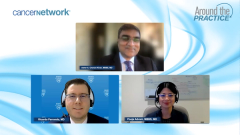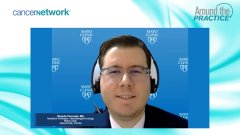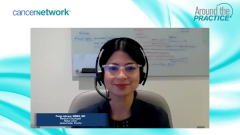
Mechanisms of Resistance Observed With Covalent BTKis in CLL
Medical expert outlines that resistance to BTK inhibitors in patients with chronic lymphocytic leukemia is commonly mediated by mutations in BTK or phospholipase Cγ2 proteins, and highlights new, unique mutation patterns in zanubrutinib; he also mentions emerging therapies including noncovalent BTK inhibitors and clinical trials focusing on BTK degradation for additional lines of therapy.
Episodes in this series

Asher A. Chanan-Khan, MD, MBBS: One thing [that] is clinically important to discuss for our audience is the mechanism of resistance [and] what we know about it today with BTKis [Bruton tyrosine kinase inhibitors] as we have gone [on] that path, using them as the first choice with this particular patient. What have you seen in the clinic, and what data direct your decision-making in terms of resistance mechanisms? What strategies do you use, Ricardo, in patients [with] BTK resistance?
Ricardo Parrondo, MD: We have whole-exome sequencing data that show that resistance to BTK inhibitors in 80% of patients [with] CLL [chronic lymphocytic leukemia]is mediated by mutations at either BTK or phospholipase [C]γ2 proteins. The BTK C481S point mutation is the most common mutation that occurs with ibrutinib and acalabrutinib, and it interferes with the binding of ibrutinib to BTK. And then there are other mutations, C481S, and then another amino acid is mutated. But those are the most common mutations that we see in patients with CLL who [experience] relapse on BTK inhibitors. In patients who don’t have mutations, data are suggesting that activation of the PI3K [phosphoinositide 3-kinase] pathway or activation of the MAP [mitogen-activated protein] kinase pathway leads to resistance to BTKis. And there are interesting recent data. The mutation pattern of zanubrutinibappears to be different than ibrutinib and acalabrutinib, which I find interesting. Whereas patients treated with ibrutinib and acalabrutinib will tend to have this BTK C481S mutation, patients treated with zanubrutinib tend to develop mutations in BTK L528T, and this decreases the activity of BTK and leads to so-called kinase-dead mutations. And they may impart cross-resistance to the noncovalent BTKi, such as pirtobrutinib. So that is a relatively recent development that has been published. And it’s worrisome because if a patient is treated with zanubrutinib [in the] front line and they develop this BTK L528T mutation, you may not be able to salvage them with pirtobrutinib and it knocks out a line of therapy for these patients. And you may have to use a BCL-2 inhibitor or a BTK degrader in this patient population.
Asher A. Chanan-Khan, MD, MBBS: From a clinical, practical perspective, if there’s a relapse happening, it is important to check for BTK resistance mechanism. And you can do that with sequencing fast. We tend to get reports within 5 or 7 days, correct? That’s fair to say. And the choice is you can go to a BCL-2 inhibitor–based regimen, whether it be in combination with a CD20 or combination with a BTKi [from the] second generation, third generation, and so forth. Or you can go to PI3K. These are still important drugs, and I find them challenging to give, and the data are very clear on that. [There are] ALLO [allogeneic] or CAR [chimeric antigen receptor] [T-cell] therapy and so forth. There are options for those patients, and I would especially recommend when such a thing happens [that] it is probably better to engage tertiary care centers and see whether there are any clinical trials that would give an edge to the patient. And here it becomes important because the resistance does happen to be BTK, so sequencing becomes an important part. It is important to figure out whether you want to start with the BCL-2 inhibitor–based therapy and important to figure out whether they are going to be on BTK initial therapy. What will be your fallback position when such resistance happens? Are there any other newer opportunities for existing patients resistant to BTKis that come to mind, Dr Parrondo?
Ricardo Parrondo, MD: Yes, there are many emerging therapies for patients with CLL and the BTK. And despite the development of BTK mutations, we’re still able to continue to target the BTK pathway. If patients develop the C418S mutation, we have the ability to use a noncovalent BTK inhibitor, and there are several of them there, [such as] pirtobrutinib, which even though it’s not FDA approved you’re able to get. I’ve been able to get it for patients because it’s listed on the NCCN [National Comprehensive Cancer Network] guidelines. And other noncovalent BTKis are in development [such as] nemtabrutinib or vecabrutinib, and they bind to BTK at another site instead of the C481S binding pocket in BTK. And even for patients who progress on those, those drugs also have their own unique mutations and mechanisms of resistance. There are ongoing clinical trials at many centers with BTK degraders, which are drugs that lead to the proteasomal degradation of the BTK molecule itself. So [in] the BTK pathway, despite patients developing mutations with a covalent BTKi, you can continue to target this pathway for additional lines of therapy. And as you mentioned, if the patient has a mutation, you can switch to a BCL-2 inhibitor–based strategy or you can do a PI3K inhibitor or a clinical trial. A clinical trial is never wrong at any stage for a patient with CLL, because we know that the disease is incurable and at some point, slam-dunk medications [such as] BTKis and BCL-2 inhibitors were in a clinical trial and patients derived great benefit from those agents.
Asher A. Chanan-Khan, MD, MBBS: It’s very intriguing biologically that if the cell is designing a mutational event in the BTK pathway, inadvertently, it’s also telling us that it still likes the BTK pathway. So going above it, preventing the BTK degrader, or going at a different site to [affect] the transmission to that pathway becomes relevant. If the patient was [experiencing progression] on the BTKi without any mutation, that creates a challenge, because that means maybe that pathway doesn’t care now. It’s like somebody is knocking on my door continuously at the office, and I have a decoy office where I’m not there, so they can knock as much as they want.
Newsletter
Stay up to date on recent advances in the multidisciplinary approach to cancer.








































